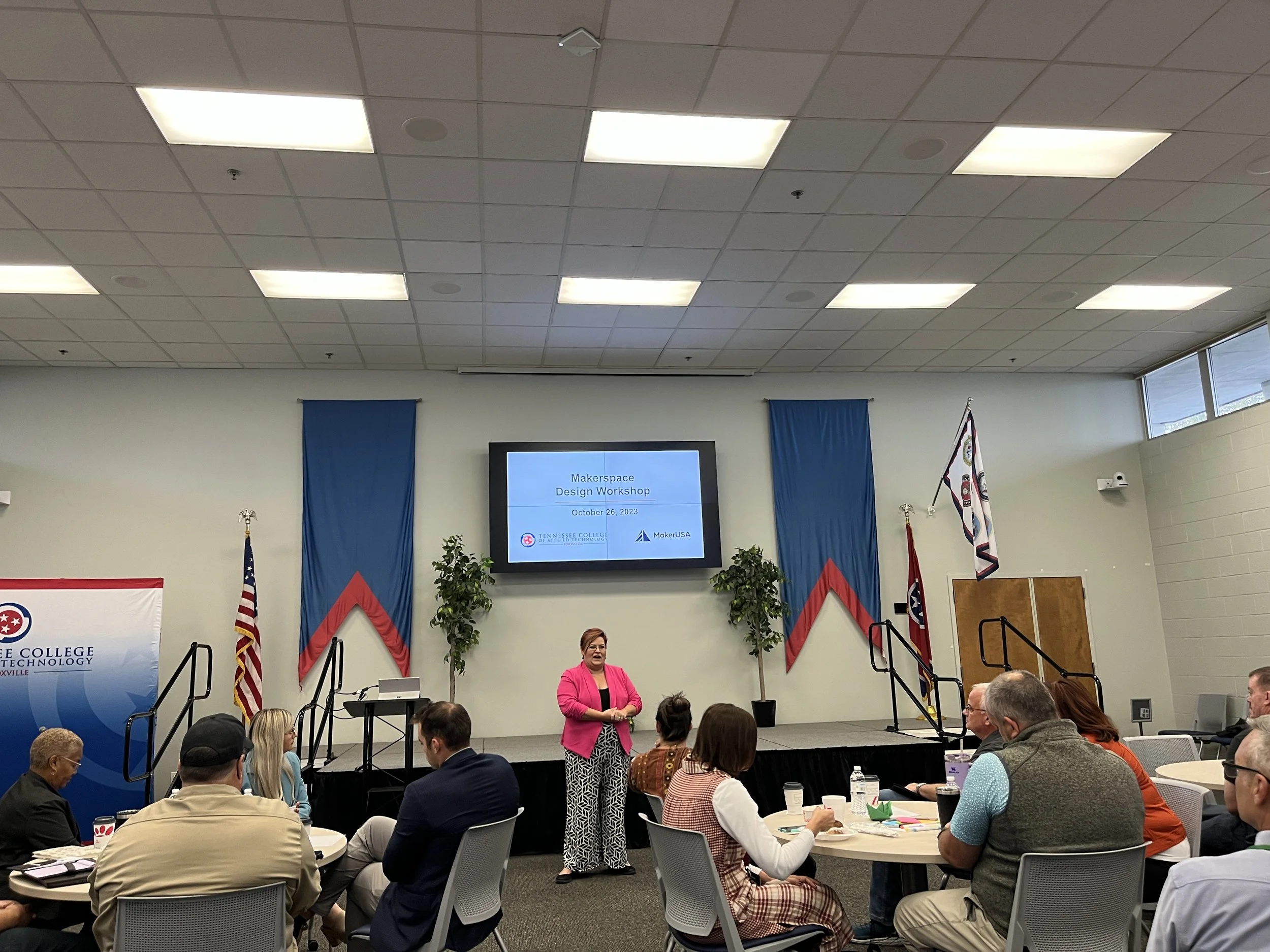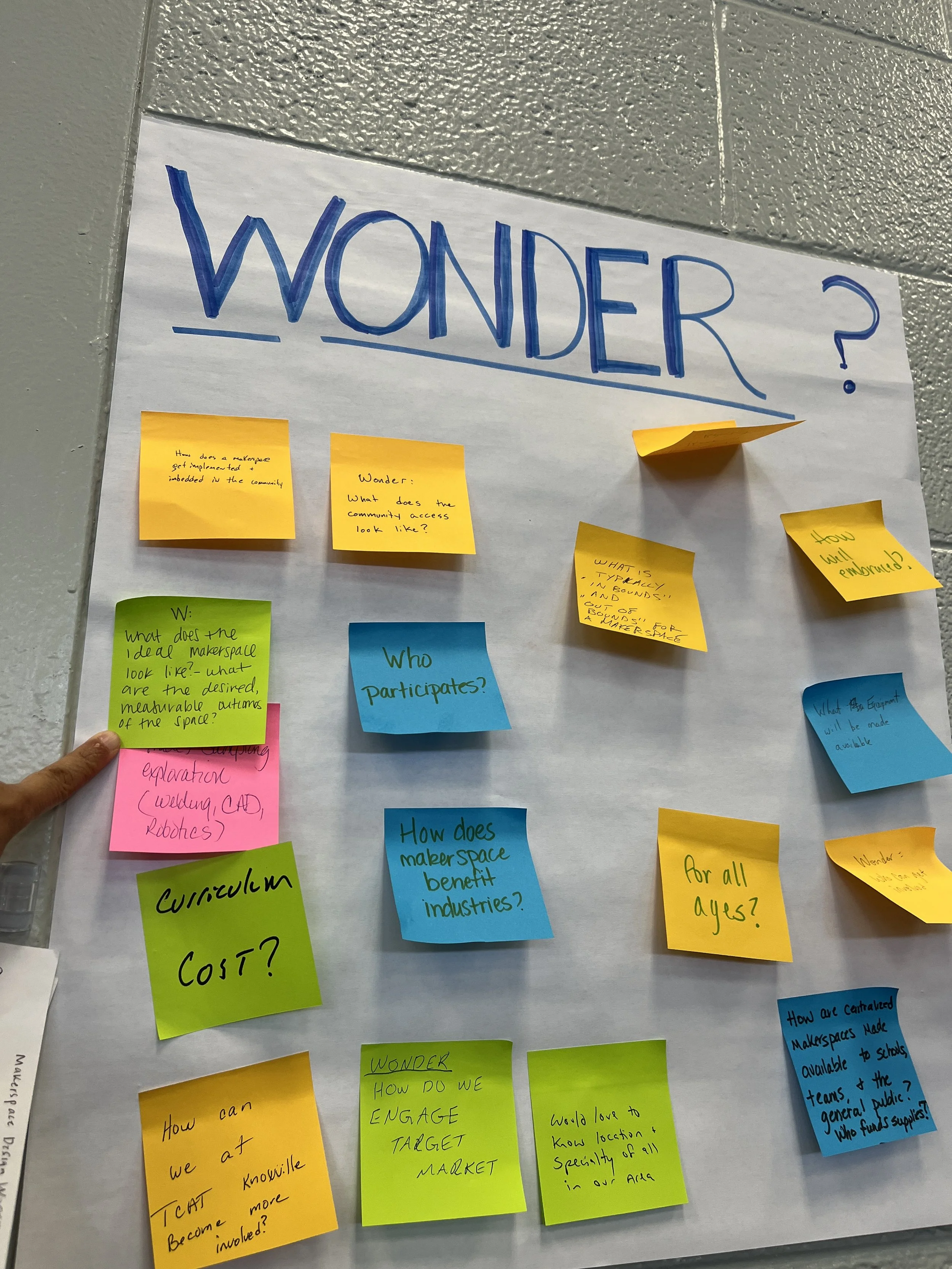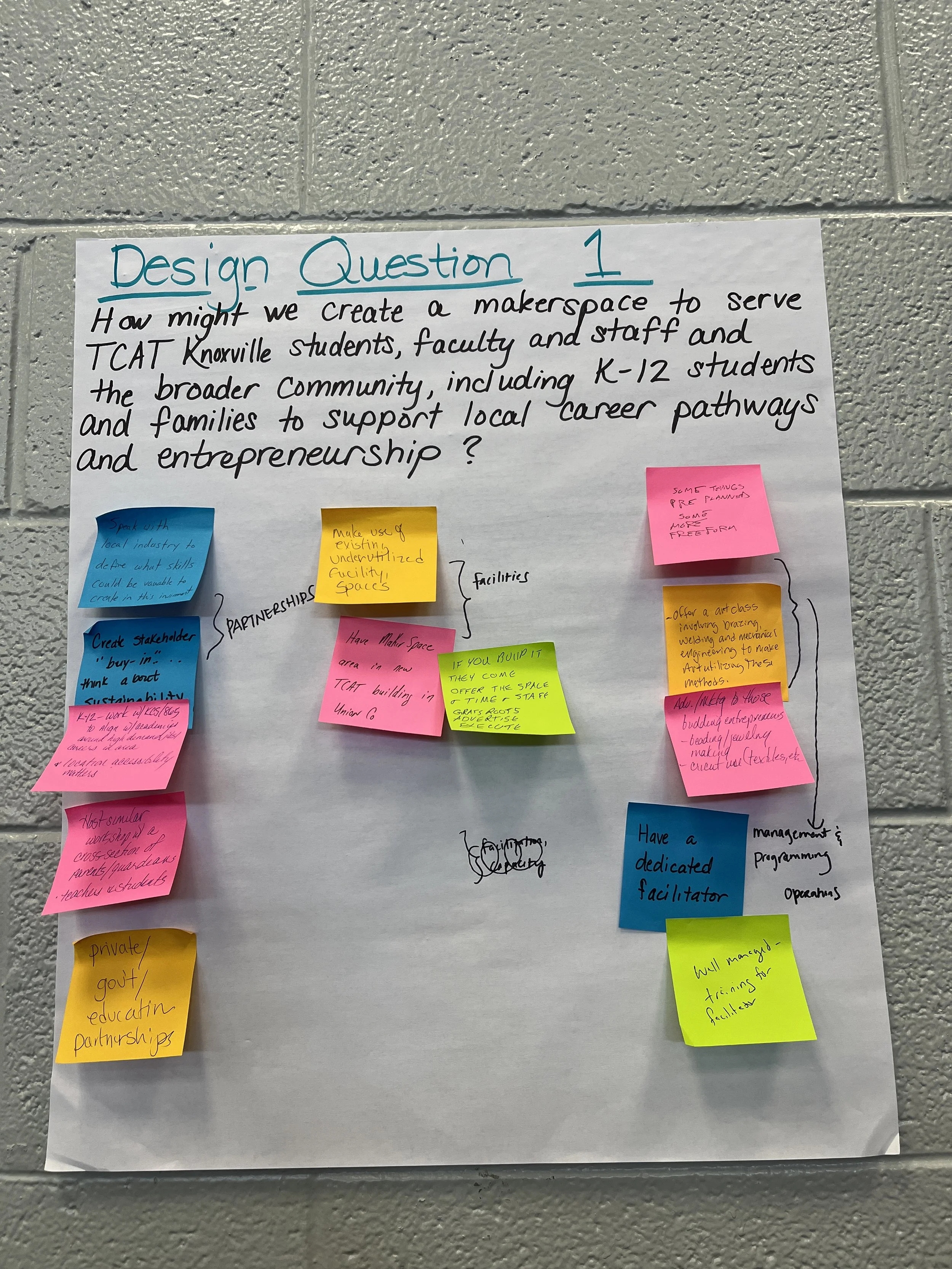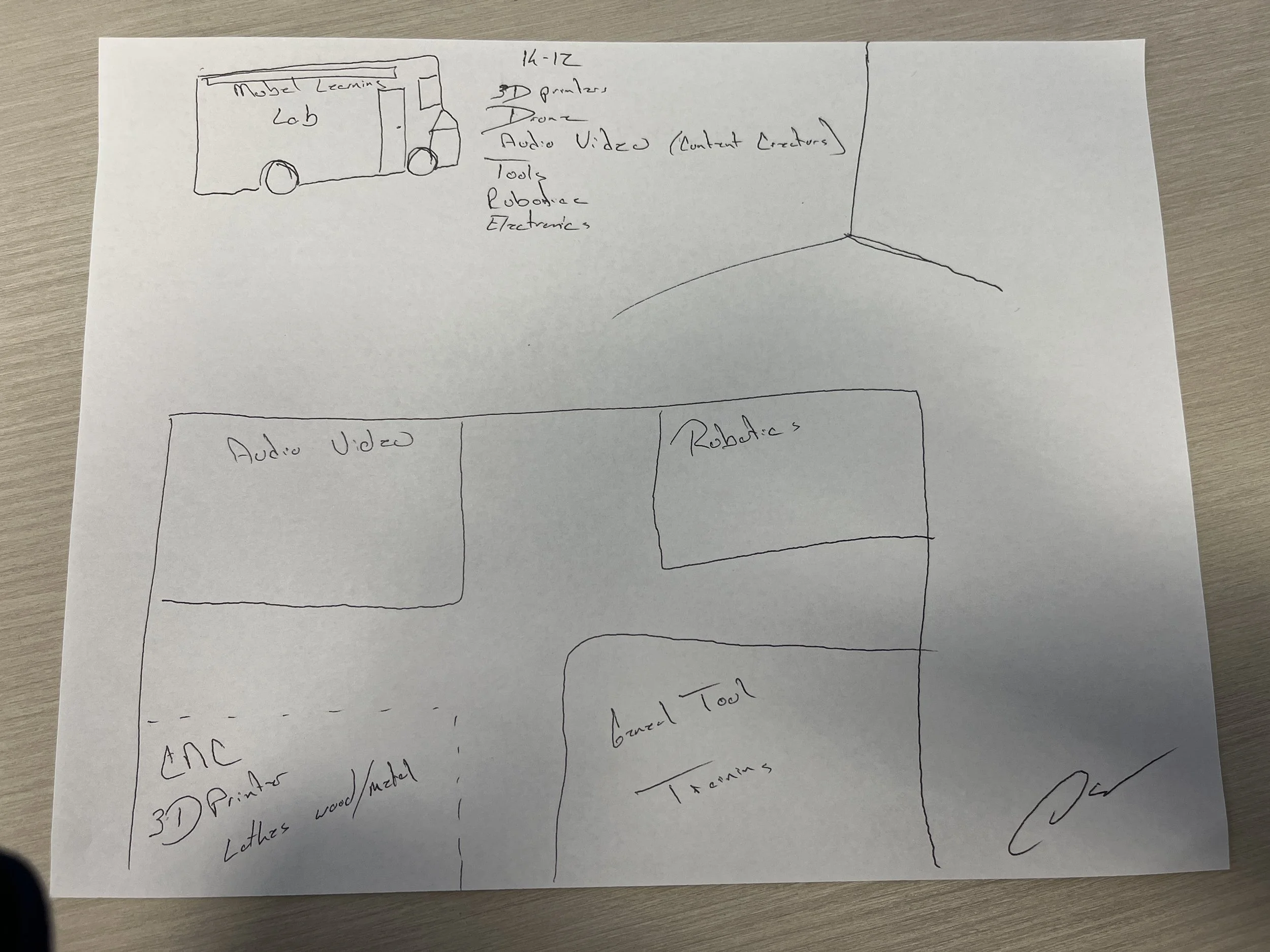Case Study
Designing and Hosting a Community Driven Makerspace Design Workshop
by Stephanie Santoso, Co-Founder & CEO, MakerUSA
Summary
This case study focuses on the design and implementation of a community-driven makerspace design workshop. This workshop was designed to bring together a diverse set of stakeholders in the Knoxville region to share their ideas and voices around an inclusive makerspace on the Tennessee College of Applied Technology Knoxville’s main campus.
The Challenge
Located in East Tennessee, the Knoxville region has a rich history of making and manufacturing and is officially known as The Maker City. In more recent years, the city of Knoxville along with key organizations and institutions in the community have focused on supporting local makers, creating more spaces for them to work on their projects, develop prototypes and manufacture their solutions and products. However, there are still individuals within the broader community that have not had as much access to these experiences and opportunities, including school disconnected youth ages 12-15 and opportunity youth 16-24 who are disconnected from both school and work. With approximately 5,000 young people aged 16-24 disconnected from school and work in Knox County, and 12,100 in the Knoxville metro area, there is a critical need for programs that support their successful transition to adulthood.
This workshop was focused on the key challenge of creating a makerspace to serve TCAT Knoxville students, faculty and staff and the broader community, including K-12 students and families to support local career pathways and foster entrepreneurship.
Target Population
The makerspace was designed to serve TCAT Knoxville students, local K-12 students, educators, and members of the broader Knoxville community.
Program Structure
The goal of the workshop was for participants to work together to develop tangible ideas and actionable steps to design a makerspace, develop programming and create a culture and environment that prioritizes accessibility and inclusion. The event took place on TCAT Knoxville’s main campus and was structured as a 2.5 hour interactive in-person workshop, from 8:30-11:00 a.m. The 25 participants were situated in round tables of 5-6 people. Workshop organizers thoughtfully developed a seating arrangement so that individuals would be seated next to participants that they might not already know but with whom they had overlapping work and interests. This was meant to ensure that participants would benefit from the event as a networking opportunity for their own work as well.
Participants were encouraged to grab breakfast and get settled during the first half hour, with the formal program beginning at 9 a.m. The workshop incorporated design thinking elements as well as a number of interactive brainstorming activities and was designed to be part of a larger effort by TCAT Knoxville to understand how the technical college can increase access to inclusive maker-centered learning in collaboration with MakerUSA. A detailed agenda and run of show here provides more information about the activities that took place during the workshop.
Kicking off the makerspace design workshop at TCAT Knoxville. Photo by Stephanie Santoso.
Key Designers
The leads for planning this workshop were Melissa Carey, MakerUSA Program Manager for Knoxville and Stephanie Santoso, Co-Founder and CEO of MakerUSA, in collaboration with key TCAT Knoxville Leadership team members, including Becky Russell, Coordinator of Community Engagement and Nick Gill, Coordinator of Workforce Development and Information Technology. These individuals also worked together to co-facilitate the various elements of the workshop.
Key Partners
The key partners for the workshop were MakerUSA and TCAT Knoxville. Key participants of the workshop included representatives from four area school districts, the Blount Partnership, which promotes economic growth and stability and fosters community development in Blount County, The Maker City, an initiative of the Knoxville Entrepreneur Center, which includes greater Knoxville area makers, artists, creatives, and small-scale manufacturers and the tool company, Snap-On.
Program Timeline
The planning for the workshop began about 2.5 months before the actual date of the event. This lead time was particularly important in securing a workshop location and developing an invitation list that included members of the TCAT Knoxville and broader Knoxville community who have busy schedules. Sending the invitations out approximately 4-5 weeks prior to the workshop is ideal to maximize the number of people who can participate.
Participants shared their questions and wonderings about the makerspace. Photo by Stephanie Santoso.
The makerspace design workshop focused on several key design questions. Photo by Stephanie Santoso.
Challenges
Three main challenges that we experienced included:
Ensuring that specific groups you want to be a part of the workshop can actually participate. We had initially invited students to participate in the workshop, but only realized after the invitations had gone out that a large student-focused event was taking place at the same time. While we had limited student participation during the workshop, we made an effort to engage students in weighing in on the design of the makerspace in other ways, through individuals and small group discussions.
Accounting for varying familiarity with the concept of maker education and makerspaces across participants. The Know, Wonder, Learn exercise was helpful in being able to quickly assess at the beginning of the workshop how familiar participants were with these topics.
Communicating back to participants how specific ideas and recommendations shared during the workshop were integrated into the makerspace design process moving forward. This was done through email updates as well as the formation of a formal makerspace design team composed of a subset of workshop participants and other key Knoxville community members.
Learnings and Recommendations
Discussions during the workshop surfaced a number of important ideas, including the need to initially focus on serving a specific group(s) of users. This would ensure the makerspace and accompanying programming and activities could be right sized for the budget and other resources available to develop a pilot version of the makerspace. Target user groups discussed in the workshop included TCAT students, faculty, and families, K-12 students and educators and justice-involved individuals. In planning the workshop, we hoped that we could foster an environment where participants, many of whom had never met, would feel comfortable enough to share their ideas with one another. Towards the end of the workshop, we asked participants if they wanted to share any additional thoughts. A machining instructor from TCAT Knoxville who is also a veteran, stood up and shared an incredibly powerful personal experience about how making things and working with his hands and tools, has been incredibly healing for him. He went on to share how he had also seen firsthand how it had helped fellow veterans dealing with PTSD.
Participants also emphasized the importance of strategic partnerships and collaborations with local organizations and institutions, specifically those that are focused on working with marginalized and under-resourced groups who do not currently have access to a makerspace or maker-centered learning opportunities.
Contact
Stephanie Santoso, Co-Founder & CEO, MakerUSA
stephanie@makerusa.org
Participants drew designs of their ideal makerspace. Photo by Stephanie Santoso.





